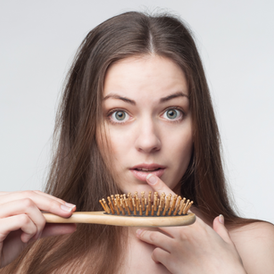top of page
We perform the most complete genetic test for hair loss, analysing both genetic factors and other relevant characteristics.


Hair-Friendly Hormone Replacement Therapy (HRT) Options
Hair loss is a common concern during menopause, often exacerbated by the decrease in oestrogen levels. Hormone Replacement Therapy (HRT) can help mitigate this issue by replenishing oestrogen, which supports hair growth and prolongs the hair growth cycle. Here, we discuss the most hair-friendly HRT options available in the UK, ranked in order of preference for their benefits to hair health. 1. Estradot Patches Estradot patches are a popular form of oestrogen-only HRT. They ar


Choosing the Right Contraceptive for Those with Alopecia: A Comprehensive Guide
When you suffer from hair loss or alopecia, selecting the right contraceptive is crucial as some hormonal contraceptives can exacerbate the condition. Hormonal fluctuations can significantly impact hair health, and while some contraceptives can help balance hormones, others might worsen hair loss. This blog will explore various contraceptive options available in the UK, detailing their suitability for individuals concerned about hair loss. Please note that this acts as a guid


Understanding Hair Changes During Menopause
Hair changes, including hair loss and changes in texture, are common issues faced by women during the perimenopause and menopause stages. Sunil Kochhar, our TrichoPrescriber, emphasises the significant role hormones play in hair health. The decline in oestrogen levels during menopause leads to a drier scalp and more brittle hair. This hormonal imbalance can also cause hair to thin and shed more easily. The Holistic Approach to Hair Loss Sunil Kochhar stresses the importance o


Understanding Normal Daily Hair Shedding
Hair shedding is a natural part of the hair growth cycle. On average, a person can lose between 50 to 100 hairs per day. This might sound like a lot, but considering the scalp has around 100,000 hair follicles, this amount of shedding is relatively insignificant and often goes unnoticed. Shedding occurs because hair undergoes a life cycle that includes growth (anagen phase), rest (telogen phase), and shedding (catagen phase). Each hair strand is at a different point in this c


Unlocking Hair Growth: How to Use a Dermaroller
for Hairline, Crown, and Beard In the quest for fuller hair and a robust beard, many have turned to dermarollers as a viable solution. This innovative tool, which might look intimidating at first glance, offers a range of benefits that can significantly enhance hair growth on the hairline, crown, and beard. When combined with growth factor serum, the results can be even more impressive. Here's a comprehensive guide on using a dermaroller effectively to stimulate hair growth.


Dutasteride For Female Patterned Hair Loss
Dutasteride is a drug that shouldn't be taken by women of child-bearing age. However in certain circumstances, and for women post menopause, dutasteride has been prescribed for hair loss 'off-label'. The use of dutasteride has shown to be helpful in several types of hair loss in post-menopausal women. For women with typical female patterned hair loss, dutasteride only works while its being used as a treatment for hair loss. Once stopped the benefits are usually lost in 6-9 mo


Oral Minoxidil For Hair Loss
What is oral minoxidil treatment? Minoxidil was originally used to treat high blood pressure. During treatment they found patients on minoxidil developed increased body hair. This ultimately led to the development of topical minoxidil applied directly to the scalp for hair loss treatment. Here at GrowBack we use oral minoxidil at lower doses than those used for blood pressure, as the low dose still stimulates hair growth with lower risk of side effects. This is an off-label t


What is Finasteride and Dutasteride?
If you search for, ‘Medication used to treat hair loss’, you will certainly come across finasteride and dutasteride. Both belong to a class of medication called 5-Alpha Reductase Inhibitors (5-ARIs). Dihydrotestosterone (DHT) is an androgen hormone that is strongly linked to hair loss and research has shown DHT to be responsible for genetic pattern baldness in both males and females. We all have a balance of testosterone in the body and the enzyme 5-Alpha Reductase converts t
Book a consultation today and take the first step towards healthier hair.
bottom of page










